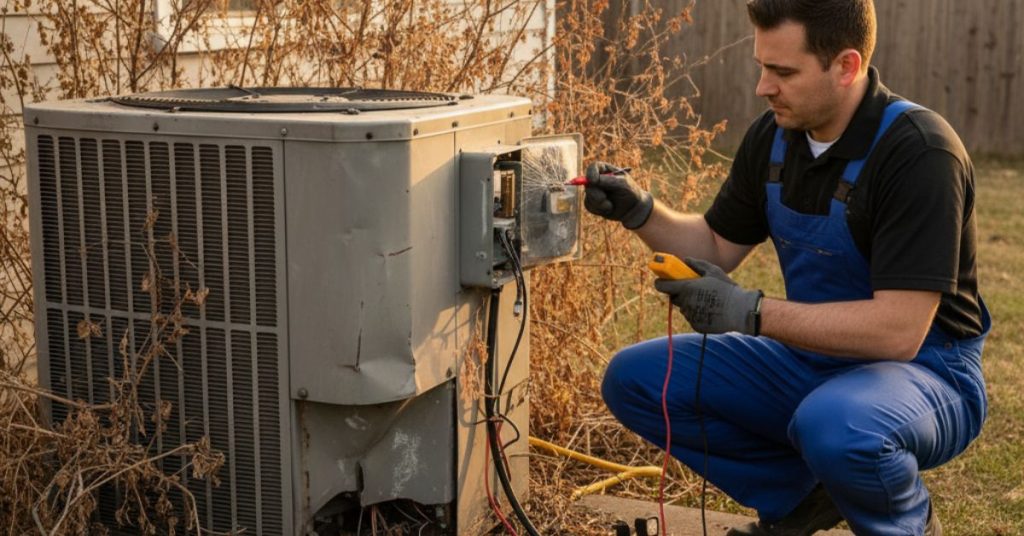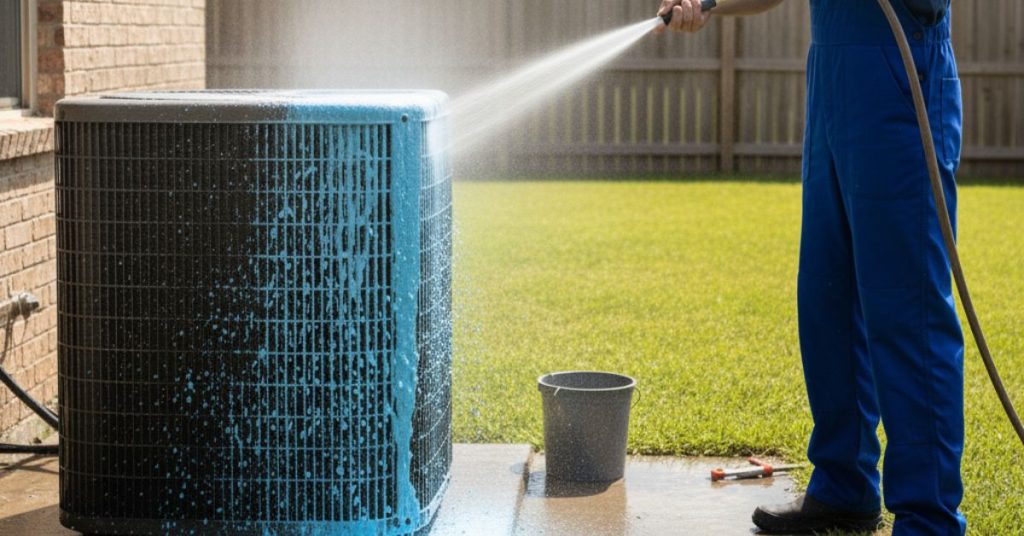Table of Contents
An AC condenser releases heat absorbed from your home, turning hot refrigerant gas into a cooled liquid for recirculation. Without it, your system can’t expel heat effectively, reducing cooling performance and efficiency.
Key Takeaways:
- Removes indoor heat
- Converts refrigerant gas to liquid
- Essential for cooling efficiency
- Impacts energy bills and comfort
When it comes to maintaining a comfortable indoor environment, the air conditioning condenser plays one of the most vital roles in the cooling process. Without this essential component, your system would not be able to expel heat, making your home unbearable during hot weather. To better understand the importance of your AC condenser, we need to dive deep into what it does, how it works, why it matters, and what happens when it fails.
Understanding the AC Condenser
The AC condenser is part of the outdoor unit of your air conditioning system. Its primary job is to release the heat absorbed from inside your home to the outside environment. It works in tandem with other components such as the compressor, evaporator coil, and refrigerant to ensure consistent cooling performance.
In simple terms, the condenser acts like a heat exchanger. It takes the refrigerant, which has absorbed heat indoors, and pushes it through a series of coils and fins where the heat is expelled with the help of the condenser fan.
How an AC Condenser Works
To fully appreciate why your AC condenser matters, let’s look at the step-by-step process of how it functions within the cooling cycle:
- Compression of Refrigerant
The refrigerant gas is first compressed by the compressor. This raises its pressure and temperature significantly. - Heat Transfer in the Condenser
The hot, high-pressure refrigerant gas flows into the condenser coils. Here, the outdoor fan blows air across the coils, which helps release the stored heat into the outdoor environment. - Phase Change As the heat is expelled, the refrigerant cools and condenses back into a liquid state. This process is crucial, as the liquid refrigerant must cycle back indoors to absorb more heat from your home.
- Recycling Process Once cooled, the refrigerant travels through the expansion valve and then back to the evaporator coil, ready to start the process again.
Why the AC Condenser Matters
The condenser is not just a component—it is the heart of your cooling system’s heat rejection process. Here’s why it plays such an essential role:
- Efficient Cooling Performance: The condenser expels heat absorbed from inside your home. If it can’t release that heat properly, the AC can’t cool effectively, leading to warm air and poor performance.
- Energy Efficiency: A clean, functioning condenser allows smooth refrigerant flow and reduces pressure on the compressor. This helps the system use less electricity, saving energy and lowering monthly utility costs.
According to the U.S. Department of Energy, proper maintenance and system efficiency can significantly reduce cooling costs and energy use in homes. - System Longevity: When the condenser is protected from dirt, debris, or physical damage, it reduces wear on other components. This prevents breakdowns and extends the overall lifespan of your air conditioning system.
- Indoor Comfort: A faulty condenser traps heat inside the system, stopping proper cooling. This causes indoor temperatures to rise quickly, making living spaces uncomfortable, especially during hot weather or heatwaves.
Signs of AC Condenser Problems

Like any mechanical component, condensers are subject to wear and tear. Recognizing early warning signs can save you from costly repairs. Here are the most common signs of a failing AC condenser:
- Warm Air from Vents: If your AC blows warm or weakly cooled air, it likely means the condenser isn’t releasing heat properly, disrupting the cooling cycle and making your system ineffective and inefficient.
- Unusual Noises: Grinding, rattling, or hissing from the outdoor unit often indicates loose parts, motor issues, or internal damage within the condenser that needs immediate attention to prevent further system failure.
- Refrigerant Leaks: Puddles or oily spots near the unit may indicate a leaking condenser coil. Leaks reduce refrigerant levels, severely impairing cooling performance and potentially damaging the compressor over time.
- Overheating or Tripping Breakers: A struggling condenser forces the compressor to overwork, drawing excessive power. This can cause overheating or frequently tripped circuit breakers—clear signs that the unit needs inspection and repair.
Visible Damage: Bent fins, dirty or clogged coils, and debris around the condenser reduce airflow and heat dissipation. These issues lower efficiency and place extra stress on the AC system components.
Common Causes of AC Condenser Failure
Several factors can cause a condenser to fail or lose efficiency:
- Dirty or Clogged Coils – Dust and debris block airflow, reducing heat transfer and causing the system to overheat.
- Refrigerant Leaks – Leaking refrigerant lowers pressure and cooling efficiency, eventually leading to compressor or system failure.
- Electrical Failures – Faulty capacitors, relays, or wiring interrupt power flow, preventing the condenser from functioning properly.
- Physical Damage – Storm debris or impact can bend fins, crack components, or destroy the condenser completely.
- Poor Maintenance – Neglecting routine cleaning and inspections allows small issues to grow into major, costly failures.
How to Maintain Your AC Condenser
Proper care and routine maintenance can extend the lifespan of your AC condenser and improve system performance. Here are essential tips:
- Clean the Coils Regularly: Remove dirt, dust, and leaves to prevent airflow blockages.
- Check for Leaks: Regularly inspect refrigerant lines and seals.
- Clear Debris Around the Unit: Keep at least two feet of clearance around the outdoor unit.
- Straighten Coil Fins: Bent fins reduce airflow and efficiency.
- Schedule Professional Inspections: Annual servicing by an HVAC professional ensures all components function properly.
The ENERGY STAR maintenance checklist recommends routine HVAC maintenance to improve performance, extend system life, and reduce energy waste.

The Cost of Ignoring AC Condenser Issues
Neglecting condenser problems can lead to expensive consequences:
- Compressor Damage: Since the compressor and condenser work closely, one failure can lead to another.
- Skyrocketing Energy Bills: A struggling condenser forces the system to run longer, consuming more electricity.
- Shortened System Lifespan: Ignoring small problems accelerates wear on the entire AC system.
- Poor Indoor Comfort: Inconsistent or insufficient cooling disrupts daily living and work productivity.
When to Repair vs. Replace an AC Condenser
Knowing whether to repair or replace the condenser depends on several factors:
- Age of the Unit: Condensers over 10–15 years old may be more cost-effective to replace.
- Extent of Damage: Minor issues like bent fins or a dirty coil can be repaired, but major refrigerant leaks or motor failures often justify replacement.
- Cost Comparison: If repair costs exceed 50% of a new system, replacement is typically the smarter choice.
- Energy Efficiency Upgrade: Newer condensers offer better efficiency and long-term savings.
The Role of Professional AC Services
While some maintenance tasks can be handled by homeowners, many AC condenser repairs require professional expertise. HVAC technicians can:
- Conduct refrigerant recharges.
- Diagnose electrical problems.
- Repair or replace faulty condenser fans.
- Perform advanced cleaning and system optimization.
- Identify early signs of component failure before costly breakdowns occur.
- Ensure proper airflow and system pressure for efficient operation.
- Comply with safety and environmental regulations when handling refrigerants or electrical components.
The EPA’s guide on managing refrigeration and A/C equipment explains legal requirements under Section 608 of the Clean Air Act for safe refrigerant recovery, recycling, and emissions prevention.
By relying on professionals, you protect your investment and ensure your system delivers peak performance.
Who to Call for Professional AC Services
When dealing with AC condenser issues, it’s important to choose a company that’s experienced, reliable, and transparent. HVAC Alliance Expert is a trusted name known for fast response, skilled technicians, and top-rated customer service.
Whether you need a quick repair or a full replacement, our team ensures quality work at an affordable cost to replace AC condenser units or any repairs. Don’t let cooling problems disrupt your comfort—contact us today and get your AC system back in peak condition.
Conclusion
The AC condenser is more than just a part of your cooling system—it’s the backbone of efficient and reliable indoor climate control. By effectively releasing heat from your home, it ensures your air conditioner performs at peak capacity, keeps your living space comfortable, and helps manage energy consumption. A properly maintained condenser reduces strain on other components, lowers the risk of unexpected breakdowns, and extends the overall life of your HVAC system.
Neglecting this critical component can lead to poor cooling performance, rising energy bills, and costly repairs. Regular HVAC maintenance and timely professional service are key to avoiding these issues. Don’t wait for a complete system failure—book a service and enjoy our promotions today for a cooler, more efficient home.
FAQs
An AC condenser releases heat from your home by converting high-pressure refrigerant gas into a liquid. This process is essential for the air conditioner to maintain effective and efficient cooling.
Common signs include warm air from vents, strange noises from the outdoor unit, or frequent tripped breakers. You may also notice visible damage or refrigerant leaks around the condenser.
Yes, you can gently clean the coils and remove debris from around the unit using a garden hose and coil cleaner. However, for internal cleaning or electrical issues, it’s best to hire a professional.
Your AC condenser should be professionally inspected and serviced at least once a year. Regular maintenance helps ensure peak performance and extends the unit’s lifespan.
If the condenser is old or the repair cost exceeds 50% of a new unit, replacement is usually more cost-effective. A professional can assess the extent of the damage and recommend the best option.


